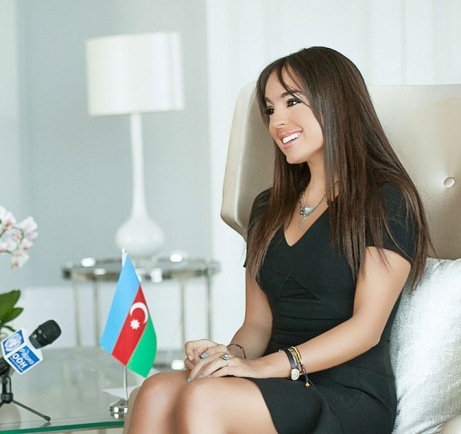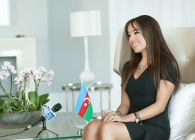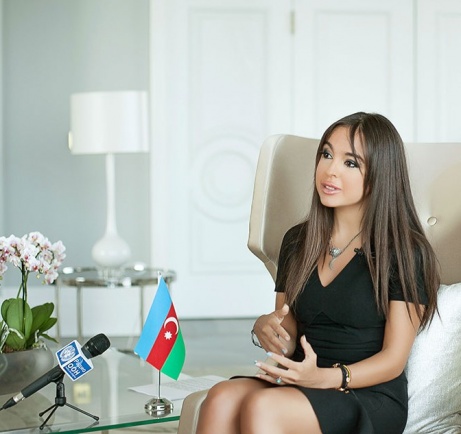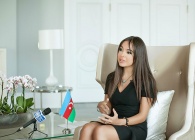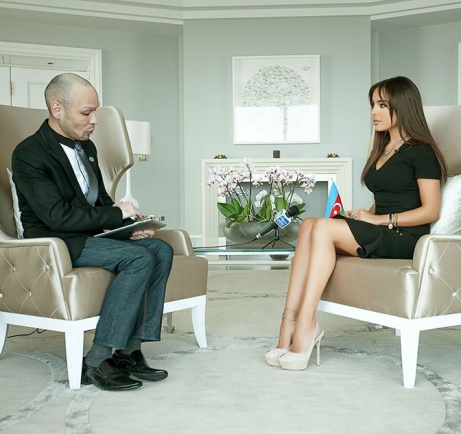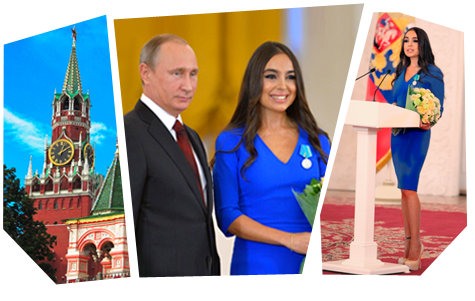
President of the Russian Federation Vladimir Putin presents the “Pushkin” Medal to Leyla Aliyeva

Vice-President of the Heydar Aliyev Foundation Leyla Aliyeva spoke of the activities of the foundation in Russia and Azerbaijan to the UN Radio’s Russian service.
- UN RADIO: You are the vice-president of the Heydar Aliyev Foundation and participate in many social projects. What motivated you to begin to engage in social activities?
- Leyla Aliyeva: The Heydar Aliyev Foundation was established in 2004. Its work covers all aspects of life - education, culture, science, charity, health, and the environment now.
What concerns me the most is a great opportunity to contribute to social activities. I believe that every member of the Azerbaijani youth wants to some extent contribute to it. Of course, if there is an opportunity to do something that can benefit, then I will gladly take advantage of it.
- UN RADIO: Tell us about the main projects of the Foundation. What projects are you personally proud of?
- Leyla Aliyeva: Projects are a lot. The Foundation organizes many cultural events, exhibitions and lectures. One of my favourite projects is exhibition "Fly to Baku". It involves 21 contemporary artists from Azerbaijan. Two years ago it started off in London, then flew to Paris, Rome, Vienna, Moscow, and ended in Baku. The exhibition has allowed the modern art of Azerbaijan for the first time to enter the global audience. It was very nice to see a positive reaction to it.
Very important to me are all the things that the Foundation does for health and working with children. At the moment, I am most worried about the project on thalassemia. The Foundation has built perhaps the largest thalassemia centre in the region. Unfortunately, this disease exists in Azerbaijan. The good news is that recently a state program on the disease appeared.
Often it happens that the Foundation launches a project, and then the state joins this activity, and a government program appears. For example, the Foundation launched program "New Azerbaijan - a new school." Under the project, about 400 schools were built and repaired. The government continued this program, and about three thousand schools in Azerbaijan were renovated.
The Foundation built schools not only in Azerbaijan, but also in Turkey, Georgia, Romania, Egypt, Pakistan after, and a school has been recently opened in Ulyanovsk, Russia.
- UN RADIO: The Foundation operates in many countries, including Russia. You recently received medals for active participation in the life of the Volgograd and Astrakhan regions. Can you tell us more about why you received these awards and what regions of Russia you are still working in?
- Leyla Aliyeva: I am honoured to receive the Order of Holy Princess Olga. I have visited Astrakhan twice. We have a lot of projects - we opened a park, remodelled a school and set the Friendship Bridge between Azerbaijan and Russia. Recently, we have erected a monument to Prince Vladimir. Also we take care of the temple that is there.
Astrakhan is close to Azerbaijan and of course, we have a lot in common. I think it's very important to carry out more activities that aim to strengthen the friendship between our countries. Our countries have a long shared history and years of good neighbourliness. And much is built on these ordinary human relationships.
And of course we have a cultural exchange. Russian literature, culture and language are well known in Azerbaijan. Our country is probably the only CIS country which almost fully preserved the study of the Russian language at schools. We have the Russian State University, Russian Drama Theatre and the Russian Cultural Centre. Recently we opened a branch of the Moscow State University. This is very valuable because, in my opinion, the Russian language is one of the richest languages in the world. This knowledge should be preserved.
- UN RADIO: You mentioned the Foundation's involvement in Russia. This year the Foundation will celebrate 10 years - it is the anniversary date. If we talk about health care, we know that you are actively engaged in HIV prevention through the Heydar Aliyev Foundation. Which results in this direction have you already managed to achieve during the existence of the Foundation?
- Leyla Aliyeva: Yes, this topic is one of the most important in the world today. In my opinion, the first thing to do is to provide an opportunity to receive an education. People should be informed about this, they should know about it.
The Heydar Aliyev Foundation conducted project "Children's Rainbow" when all the children were given a lecture about HIV. Also, the Heydar Aliyev Foundation is supported by the Vishnevskaya-Rostropovich Foundation, which conducts the survey for hepatitis B and HIV. The Azerbaijani Youth Organization of Russia "AYOR", which operates in Russia, is working actively in the field of AIDS. Our activists hold lectures at various universities in different regions of Russia, and we have also organized a conference on this topic.
Every year we hold campaign "Blood Has No Nation", during which Azerbaijani youths donate blood in Russia. There was another project "Make sure that you are healthy, say no to disease". On that day, anyone could get a free screening.
- UN RADIO: In the beginning, you have been in Nairobi, where you met with UN Deputy Secretary General, the head of the UN Environment Programme (UNEP), Achim Steiner. Can you tell more about the results of your visit and what, in principle, did you agree on?
- Leyla Aliyeva: It was my first visit to Africa. I have been engaged in ecology for three years after IDEA (International Dialogue for Environmental Action) appeared. This is a campaign which aims to protect the environment. The campaign aims to work with young people in our region. We are trying to bring a creative approach to all our projects.
Projects already implemented are many. If we talk about the main, it is planting three million trees in Azerbaijan, which represents three million young people living in the country.
Another project is building nests for birds. Prior to this, bird nests were at the Maiden's Tower, which is the symbol of Azerbaijan. When the reconstruction of the building began, we realized that the birds cannot survive, so directly on the opposite side we built an art facility with nests where the birds could move to. We have so many ideas. One of the main directions is the protection of endangered animals.
In May, there will be one of the biggest conferences on the protection of the feline species. In Azerbaijan, there is Caucasian leopard. This animal is at the risk of extinction. The danger is that you cannot grow it up and release into the environment, it will not survive. So now we invite experts from around the world who will think about a solution to this problem. We are actively working with the Wildlife Fund in Russia to protect bison and Caucasian leopard.
As for Kenya, it was an unforgettable experience. After that, you realize that any nature is valuable. Back in Azerbaijan you realize that we have everything else. We have nine of the 11 climate zones. It is important that people have enough knowledge, education, and they realize how valuable it is.
- UN RADIO: It is known that in Azerbaijan, even at school level a great attention is paid to the environment.
- Leyla Aliyeva: Yes, it is, really. IDEA has built a couple of environmental classes at schools and universities. Now we are working on a textbook for students. Then, this is such kind of a thing that is interesting for any child. Yes, we reflect on the many challenges, but it applies to any person, no matter where he lives. We even have the slogan "One Planet - One Future".
- UN RADIO: In addition to your social activities, you are heading the Azerbaijani Youth Organization of Russia "AYOR". You recently opened exhibition of Reza Deghati dedicated to tolerance. In your opinion, what other steps can be done to better understand the issues of tolerance between the Azerbaijani and Russian people?
- Leyla Aliyeva: This exhibition was very successful. It was held at the Jewish Museum and the centre of tolerance. Tolerance for us is not a thing which we are proud of, it is a lifestyle, it's a norm. This is because people of different nations and religions historically inhabited here.
We had a fire-worship, Zoroastrianism, Christianity came to Azerbaijan in the IV century, Islam - in the VIII century, the history of Judaism appeared two thousand years ago. Today in Azerbaijan you can see mosques, synagogues, churches and temples of Zoroastrians. All are close to each other. You can hear different languages. We have 21 non-Muslim religious communities in Azerbaijan.
This is very important and valuable. Unfortunately, in today's world sometimes you have disagreements and conflicts because of the reluctance to accept and understand each other. Therefore, I believe that Azerbaijan, to some extent, can serve as a kind of model. And, of course, it was very important to hold such an event in Russia, because we have a lot in common. Russia is home to about 100 different nations and representatives of religions. It's is very valuable.

